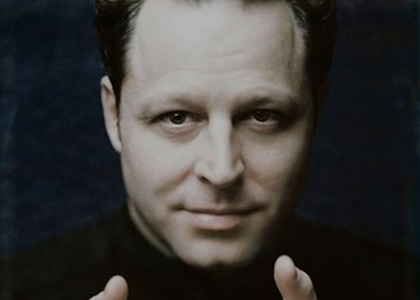> [Archived] Interviews

Interview with the American conductor John Axelrod
The concert that opens the season of the National Radio Orchestra, will take place on Friday, October 13th, starting at 7 p.m. Under the baton of John Axelrod, the ensemble will perform to the public an entire Rachmaninoff programme, with Roman Borisov as the soloist. We will learn some details about the concert's programmefrom the evening's conductor, John Axelrod.
First of all, let's talk a little bit about the programme.
Well, on a personal level, this programme is special to me, not just because it features one of my favorite pieces, in particular Rachmaninoff's Second Symphony, which is not only one of his most popular works, but one of my and my wife's favorites as well. Let's say is the theme of our love. But the Rhapsody on a Theme of Paganiniis also has sentimemtal value, because when our son was born, he was actually born on the Eighteen Variation, you can hear it on the video recording.
One significant aspect about this date - October 13th, the concert date: it's my mother's birthday, who passed away 13 years ago.Many bonds can be created in this programme, which is why you need to understand that I'm not only involved in conducting and performing this music from a professional point of view, but also on a personal level, especially with the National Radio Orchestra, an ensemble I already know well enough and with which I have a very special connection.I'm close to many of the musicians, so it's more than a concert, it's a family reunion!
How did the rehearsals go?
Incredible! It's interesting that the opening of this season, along with the "Enescu" Festival, will beafter the end of summer, when there's always a certain vibe during the first rehearsal after the break, when people are just getting back into the swing of things, as we say in English. But it was incredible, and I offer all my congratulations and appreciation to the orchestra for their wonderful performance. In each rehearsal, we dig deeper into understanding the music, and I think that for the audience in the hall and for those who will listen to us on the radioit will be a great way to start the season.
I would like to make sure I understood well: Is Rachmaninoff one of your favoritecomposers? Or is just the Second Symphony one your favorites?
I love all of his work. He is in fact one of my favorite composers. I find him a little bit misunderstood, considering that, despite composing his music after the early 20th century and immigrating in the United Stated, just like Korngold, he was criticized for being too romantic during a period when dodecaphony grabbed the academic attention of modern composers and critics in the early last century. Both Korngold and Rachmaninoff were leading what we could describe as late Romanticism. I believe that now, after a century, we managed to understand and resonate more with their music. I think what's important to understand about a composer is not only their past-selves - although we must be aware of their historical context and the way they created music -but the relevanceof theirworks in our present days.What does Rachmaninoff tell us today? What does Korngold tell us today? What does Tchaikovsky tell us today? What does Beethoven tell us today? All these composers are not just artifacts of the past, they are relevant in our times. They are timeless now and forever.
Translated by Tania-Ana Lupu,
University of Bucharest, Faculty of Foreign Languages and Literatures, MTTLC, year I
Corrected by Silvia Petrescu














